I haven’t taken a day off in over a month (including weekends), and it was only last week, and with medication, that I began to sleep more than three hours a night. I am keeping an eye on the Help Desk over the Easter weekend, and if it gets busy this post will never reach you.
Mike’s thread expresses how many of us feel today very well. I don’t want to be trying to write a clapback post in this rare and precious lull. And really, I shouldn’t be.
I was still on vacation visiting my Mom in February when I got a sense of where we might be headed. I started to assess what might come down in the event of a campus suspension and what it would mean for our learning technology team. My university is somewhat unique in a few ways. It came into its present form when an open and online distance institution was merged with a regional university-college. So while we have evolved over the years, in some ways we still live something of a dual existence. I figured the Open Learning side of the operation would be in much better shape than most, though it would still be faced with immense challenges for things like exams, student care, and day-to-day operations.
But it was the campus side that had me most worried. About half of our face-to-face courses had some sort of online presence, mostly a Moodle shell, but most of those courses emphasized the in-person experience and tended to use technology for course administration and/or file sharing. Our team has been working hard to build digital literacies with our campus community, but we are just one group working to advance our interests at a complex institution with many challenges and limited resources. If our F2F courses had to immediately move to alternate modes of delivery, we knew our little campus support team would be overrun in humiliating fashion. The prospect of what lay in store was truly terrifying to us.
And many of our fears have come true. I can’t and I won’t try to tell that whole story, but here is a quick overview of how we approached this…
We had about a week where we were pretty sure some sort of class suspension was coming, though we didn’t know how, or when. At that point we agreed to plan for worst case scenarios, which has been our approach ever since — except for those times when reality has proven worse than our biggest fears. We expected to be approached by hundreds of instructors who would want an immediate and comprehensible path forward. They would be anxious, uncertain and in many cases have little experience with online technology, much less online instruction.
So, we focused on making sure our core toolset was in order. We fast-tracked some long-planned system upgrades, and our wonderful colleagues in IT significantly boosted our capacity. We decided to limit ambiguity for new users, if they were new to tech we were not going to bombard them with options. We created a stripped-down Moodle Help site (in Moodle) that focused on the essentials as simply as we could. We prepped tutorials on BigBlueButton and Kaltura, and couched them in language urging instructors to use these tools mindful of a student population with uncertain access to computers, bandwidth, privacy, and who of course were dealing with a pandemic in their lives. Our team partnered with Open Learning Instructional Designers and the Centre for Excellence in Learning and Teaching to launch Pivot to Digital, which offered strategies for things like online facilitation and assessment through the lens of student care.
When the announcement of course suspension dropped, we had a message for faculty ready to rip, letting them know what was available and how to get help, and ran scripts to make sure all instructors had access to our resources, to us, as well as a faculty discussion forum. We identified a group of confident users, the Faculty Avengers, from across the university to help us get our messages out, and to ensure we were aware of problems as soon as possible. We set up regular online drop-in sessions. We tried to identify additional staff we might re-deploy to the Help Desk, and began to train them. We played an active role in moving the entire Open Learning division to be ready for virtual work, setting up Mattermost, arranging home software licenses, getting gear for people who lacked an adequate home set-up. As of that Sunday, we were still terrified of what was to come, we did not feel ready, but we also felt we had done everything we could to prepare.

I can’t begin to describe what has happened since. Pure mayhem. A few weeks back Mike Caulfield said something like “being an ed tech right now is like waking up every morning to a sewer backup and your apartment flooded.” It is like that, except it’s a different and equally horrible issue to deal with most days.
But somehow, we’ve held it together. Other than some delays in processing BigBlueButton recordings (which will happen when you are getting more than 700 in a day), our open source stack has held up and had only occasional sluggish patches. And when things gum up, our amazing sysadmin Mike is usually on it before we notice anything. We have at least responded to every Help Desk ticket on the same day (usually within the hour), and we have been able to resolve almost every issue in a matter of hours. We’ve produced just-in-time help tutorials and videos as needed, provided personal guidance in the virtual drop-ins, and the Faculty Avengers and others have provided a critical layer of peer support.
I certainly could not list all of the people who have stepped up over this period, working outside their regular duties and beyond all expectation for commitment. I’m going to mention just three of them here, not because they are more important but because I will be referring back to them later. Jamie Drozda has been holding down the Help Desk for years now, and over that period she has demonstrated she is a master technologist. She has a deep knowledge of Moodle that is terrifying, and can handle any other tech we throw her way. Her ability to guide even the most anxious instructors through intimidating processes is the stuff of legend. Jamie’s focus on consistency and quality has brought the whole operation to a pretty impressive level. Brenna Clarke Gray joined us only last August, and though she still describes herself as a newcomer to the field of learning technology, she threw herself into it so hard she quickly got herself up to high speed. More on her later. And Jon Fulton, who has long excelled quietly producing learning video mostly for Open Learning courses, stepped into a massive gap in our skillset when we had to roll out the Kaltura platform much more quickly than we anticipated. He has been truly amazing, it’s as if he’s been a frontline learning tech for decades.
Here are some things I never have to do with our team: try to motivate them, ask for a higher standard, or worry about them straying from our core principles. To the contrary, sometimes I am tempted to wobble on something in the name of expediency, and they then insist on student care, consistent high levels of service, accessibility, ethics, openness. We have fun together. If you listened in on our meetings, or followed our Mattermost threads, you might mistake our irreverence for a lack of care. Far from it… nothing is more likely to set off an explosion of indignant brutal humour than seeing someone else being careless, especially if it hurts the quality of our offerings.
Here is what I do worry about with them, especially now: their well-being. One way I do need to be firm is on limiting their hours, their days, how far they are willing to go to make somebody happy. These past few weeks have been such a grind, interspersed with chaotic nightmares, I cannot find the words to express it. I see it in their drained and strained faces when we check in on BBB, I hear it in their voices, even when we are joking around, maybe especially then. The immense pressure results in the occasional breakdown in communication or misunderstanding, and we all feel so fragile. They care so much, are giving so much of themselves, often invisibly — or worse, sometimes met with disrespect. I am immensely moved when I think about how much they are prepared to give to provide the best possible experience for the most possible students. I am immensely frustrated and angry that I evidently cannot do more to protect them and advance their interests.
Of course, there is a version of this story happening at countless educational institutions all around the world. I am grateful to have a rich network of accomplished peers in many places, and it is amazing how similar all of our stories are.
And again, as I said off the hop, I am worn to the nub. Until recently, I was not sleeping, often forgetting to eat, just propelled for weeks on adrenaline alone. I felt like and no doubt came across as some cocaine freak in a Martin Scorcese flick. I’m grateful I sought help and while I am still extremely raw, I am sleeping more and eating regularly, and I hope I am out of immediate danger.
And that is my status update. The post continues, but it gets dumb and petty from here. That includes me. I would not be offended if you bailed out now on this tale of Canadian idiots mixing it up. I promise, you won’t be any worse off.

The dumb fun starts when I read this by Stephen Downes, in response to a blog post by Clint Lalonde which had presented some sound and increasingly pertinent cautions about using Zoom.
Online learning should be fast, fun, crazy, unplanned, and inspirational. It should be provided by people who are more like DJs than television producers. It should move and swim, be ad hoc and on the fly. I wish educators could get out of their classroom mindsets and actually go out and look at how the rest of the world is doing online learning. Watch a dance craze spread through TikTok, follow through-hikers on YouTube, organize a community in a Facebook group, discuss economic policy in Slack. All of that is online learning – and (resolutely) not the carefully planned courses that are over-engineered, over-produced, over-priced and over-wrought.
I mean, I have written and said things like this in the past. In the distant past, sure. I was young. It was a crazy time. And I haven’t given up on why that approach can be useful at the right times… One of the saving graces of this moment has been the revival of DS106Radio, which is a space for pure creative communitarian anarchy on the open web. I still like to get up to online learning crazies, and if someone comes to me with a weird idea and asks my help, I am usually all in.
But again, these are not normal times. My reaction when I read Stephen’s piece was to chuckle to myself, and marvel at the sheer self-satisified cluelessness. Stephen may work in a rarefied remove from people on the ground… but he still follows learning tech networks… I mean, read the room. I thought about replying then… But Clint and others were responding just fine, and I had 300 flagged emails in my to-do folder.
A while later I saw Matt Crosslin’s Tweet…
…and so I impulsively tossed up a short reply.
Anyhow, what seemed to me a fairly straightforward point set off a volcanic explosion of indignance from Mt. Downes: across Twitter, comments across multiple blog posts, his own blog… Many of the points he made were perfectly reasonable. Then again, I haven’t read them all. No one person possibly could. But again, everything I saw felt very much out of step with the present moment. I really was starting to regret saying anything. But also getting a wee bit annoyed by the sheer ferocity and relentlessness of it. I felt like an angry Amway salesman had moved in next door.
First off, nobody “subtweeted Stephen out” of anything. I responded to Matt’s Tweet. That’s how threads work.
Second, our team works at a university that is open access for most programs, has one of the largest offerings of open online programs and courses in the country, most of them continuous entry, and self-paced, which means they appeal to working people, parents, etc… We serve huge numbers of non-traditional learners with all sorts of unique challenges, we support amazing PLAR programs, on campus and online. We serve our interior BC small city in myriad ways. Stephen is a researcher for the National Research Council of Canada, and has been for ages. But apparently I am the elitist.
And again, it is clear here and elsewhere the contempt that Stephen has for the people who are presently working themselves ragged in higher education right now. He has his right to feel that way. We don’t have to like it.
I tried not to say anything. It would be pointless — when has Stephen Downes ever acknowledged he was wrong about anything? Arguing would be an energy suck, and would only upset me when I had many more important things to do.
And others were saying it better anyway.
My resolve to steer clear weakened when I saw George Siemens’ reply to Stephen:
I have to admit, this is an amazing Tweet. Just look at it. Reality really is weird. I have reread it many times and am still not sure which side this is on. Everything is flipped. It’s like an ancient Greek oracle, it embodies its own opposite meaning inside itself, the truth lies… where? “xmoocs win.” Is that something to worry about, or something to celebrate? I mean, George’s response to this present moment is to set up an xmooc.
My admiration for the zen koan qualities of the Tweet aside, I am fixated on that bit “learner agency replaced by care and concern.” I’ll get back to that later. But for now, let’s stick to the dumb stuff. George’s Tweet did play a large role in nudging me to try my own hand at a maxim.
Which immediately got RTed by Stephen, and prompted this from George:
Again with the subtweeting.
Now, if someone vaguely complains about people with “perpetually aggrieved egos” that demand constant attention, and your reaction is “everyone will know he is talking about me”, and then you immediately take it to Twitter… Well, I’m not quite sure what to tell you.
I hate to undermine the guys’ feelings of self-worth yet again, but I have to say, this isn’t all about you. Were George and Stephen among the thought leaders I was feeling annoyed with when I sent my petty and peevish Tweet? Absolutely. But Stephen and George are just two of an awe-inspiring panoply of ego-forward thought leaders in ed tech, and I am annoyed at many of them. Now more than ever.
How can you identify the perpetually-aggrieved thought leader if you see him in the wild? He’s almost certainly an older white dude who rode a wave when the web and online learning were relatively new, and things were changing fast. Back then, you could get attention pretty easily if you were an early blogger, had confident patter, a few presentation tricks, and the ability to describe some fairly obvious trends that were still new to most people. (I know this, because I am a white male that heavily benefited from this wave myself.) But now, the keynote invitations don’t come so often. The readership is way down. The oracular pronouncements don’t get the huzzahs that they used to. Sometimes when they act like jerks somebody calls them out. This makes them sensitive, defensive and ornery. Obviously it is the community that has lost its way. Something something coddled millennials something political correctness.
Some of them still do quite well with corporate side gigs, while carefully managing their images as progressive voices for learner agency, and with disdain for elites. For instance, a successful thought leader might bemoan the damage wreaked by one cola company, while working that same week with another.
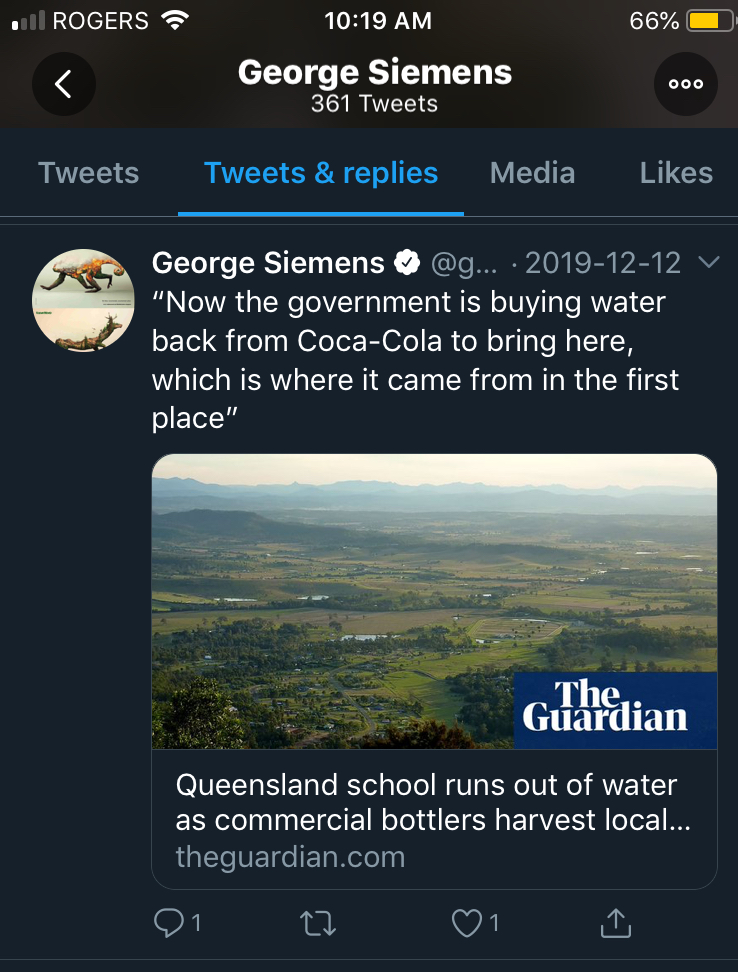

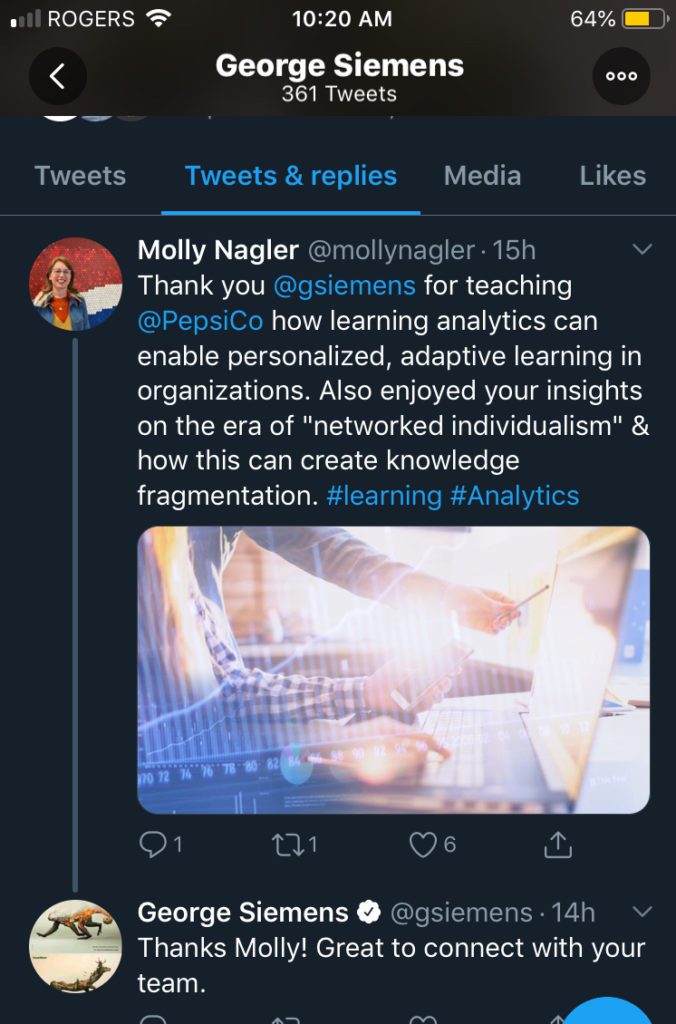

We now return you back to stupid storytime…
With the limited time yet boundless petty spite at my disposal, I had done my best to scale the heights of peevish dumbness. But clearly, I was a novice climber flailing to keep up with master mountaineers, dragging them down on the ropes and pulleys. We had yet to ascend the Mount Everest of moronosity in this Himalaya of horseshit.
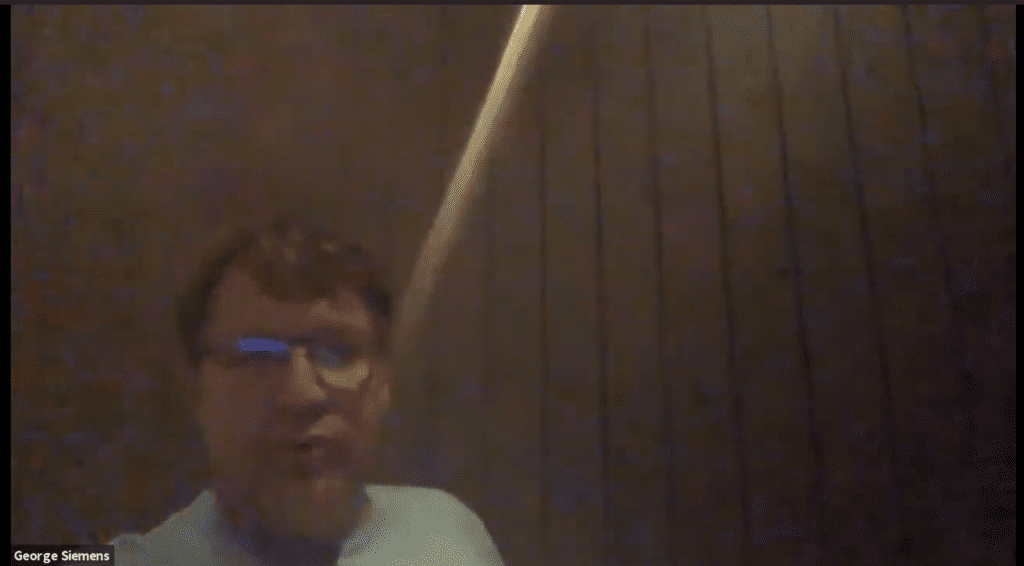

I started getting DM’s from various people with links to a YouTube video, saying “have you seen this?”, “what the hell is happening here?” and “go to seven minutes in LOL”… but it wasn’t until Friday that I finally watched Week Three of the edX Pivoting to Online Podcast. I don’t have a lot to say, but I do request clarification. I don’t really do edX MOOCs… are they usually structured around shitposting on lame Twitter beefs? If they are, sign me up, I want my certificate, because this video rules.
Dave Cormier does a better job of pushing back than I would, and maybe I can’t get past the Blair Witch Project aesthetic of the video, but does George really dig in on the notion we should be focusing our attention on the 5% of autodidacts that don’t really need education anyway? What was I saying earlier about the thought leaders’ contempt for us?
I’m trying to have fun with all this, but here’s a serious warning: don’t call me a hippie.
What was that about me wearing a tuxedo? I’m more a Canadian Tuxedo kind of guy.




Anyhow… lesson learned. If you post something that might be taken as a subtweet by the Canadian Connectivists, get ready for the steamroller.


I do have to wonder… all that attention for a couple snarky Tweets. I RT’ed far more pointed comments from Brenna on all this into my timeline (which was clearly being monitored closely), and saw some thoughtful and more on-point remarks from Heather Ross, Anne-Marie Scott, Laura Gibbs, Tannis Morgan, Tanya Elias, Audrey Watters, and others that did not get any response so far as I can see. I wonder how that could be…? What do I have that they don’t?
I didn’t want to throw an unfounded allegation around. And I’m told that data visualization is a critical literacy for any aspiring online learner. But again, I couldn’t bear to follow all those Tweet threads down their little holes. Thankfully, I was able to ask a friend for assistance. And even better, they sent me this.
The finding: in the great hubbub emerging from Matt’s initial Tweet, Stephen talked to men 50% more than women. And when he talked to men he said about twice as much as he did when he talked to women. And he did not respond to or even acknowledge strong comments from Audrey, Anne-Marie, Tannis, Heather.
I’m also advised by the discourse analyst that “we could go into all sorts of places with this. There’s definitely something in here about the number of tweets where he’s taking personal offence, as well as where he’s pushing back.”
Anyhow… remember 5000 words back when I said I wanted to return to “learner agency replaced by care and concern”? Let’s pause the dumb parade and do that now.
Man, that really is an astonishing piece of writing. Gets me every time.
Learner agency vs. care and concern: what a harmful dichotomy of concepts to place in opposition to each other. I take personal exception to that opposition being applied to our team, because we have put a lot of effort into emphasizing online agency within a framework of ethics and care. We love us our flexible open tech. Jamie and Brenna have done many excellent workshops on learning in the open, and using interactive tools for practice such as H5P. One of the last workshops our team did before closing up F2F shop was Knowledge Mobilization and You: Scholarly Podcasting for the Whole TRU Community by Brenna and Jon, and in addition to a rich exploration of the pedagogical and research applications, they did a fantastic practical toolkit with really cool fun videos on how to actually do podcasting. We hope people will find them useful and resuse them!
And of course, there is Brenna Clarke Gray’s truly epic Digital Detox 2020, which was inspired by and we hope complements the Middlebury Digital Detoxes. Brenna takes on topics ranging from ethics, equity, algorithms, sleazy vendors, academic integrity, resistance, radical openness, and care. Each of her pieces radiates brilliance and passion, she does her research, and she writes with eloquence, warmth and wit. Unlike the thought leaders, everything she puts out is tested against the daily experiences of working hand in hand with TRU learners and instructors, and with educators beyond. She leads some really engaging discussions on the site as well. It absolutely blows away anything the thought leaders have done in years. And she is just getting started.
When George suggests in that Unabomber manifesto video that I have abandoned my commitment to open technology, I’ll point to our open source toolkit we make available to everyone in the TRU community. TRU is also where Alan Levine built the first SPLOTs, simplifying user experience and protecting privacy, and we use them all the time. Just because we aren’t throwing new users into the deep end in the middle of a pandemic does not mean we have given up on this stuff. This should be obvious, but maybe not if your own day-to-day worklife is completely removed from reality.
Then there is the OpenETC. Tannis Morgan has just published this overview of some of the ways the open toolset is being used by BC educators and learners. We are making highly powerful, flexible, and innovative open ed tech available for free and without taking our users’ data. We are building on-ramps that make using the tech significantly easier, without taking away any of their ability to go in a completely different direction. We are seeing them do amazing things with it. The thought leaders would have you believe that passive acquiescence to big tech and surveillance capitalism is inevitable. They can live like frightened miserable baby chicks trapped in their factory-farm cages, we are hitting the free range… ride or die, as it were. And we are having a fucking blast as we do it.
More on recent work with the OpenETC is available on our OER20 presentations page. We had a lot of fun doing these. We took this opportunity to revisit what we are trying to do given present reality. “The mass pivot to online has been a largely necessary retreat to a limited and conservative set of learning technologies and so this talk considers how the OpenETC and it’s particular affordances might need to respond to that. As it turns out, the OpenETC focus on rich turnkey solutions, spaces for rapid distributed collaboration, all underpinned by an ethos of sharing might be just exactly what’s needed.”


It’s all a little ironic, because the thought leaders mostly made their names saying that the power was in the network. And in that they were correct. In recent weeks, I have taken leadership and inspiration from diverse and reassuringly resilient networks.
Thank you #FemEdTech for a network built on inclusion, critique, creativity and care.
Thank you BCcampus for showing a willingness to shift quickly in response to need, and for your attention to the most vulnerable among those we serve. And for being there for all educators in the province.
Thank you #DS106Radio for staying on the air in the quiet years, and for being an incredible connector and outlet for so many of us now. I’ll try to behave a little better in the future. Except when I don’t.
Thank you PressEdConf for connecting a group of wildly innovative open ed techs in the loosest and most fun online event possible. I keep finding gems in the archives.
Thank you OER20 for moving a precious gathering of people online under duress, with a huge heart, and showing we are still a network that can invigorate and support one another. And thank you for opening the incredible sessions to all. Care in Openness.
Thank you to every exhausted, under-resourceed, underappreciated, ragged learning technologist out there. We’re doing our best. We’re going to need each other to get through this.

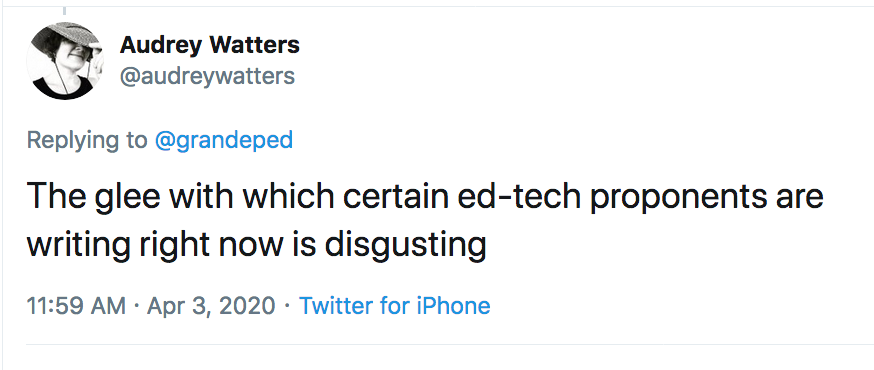
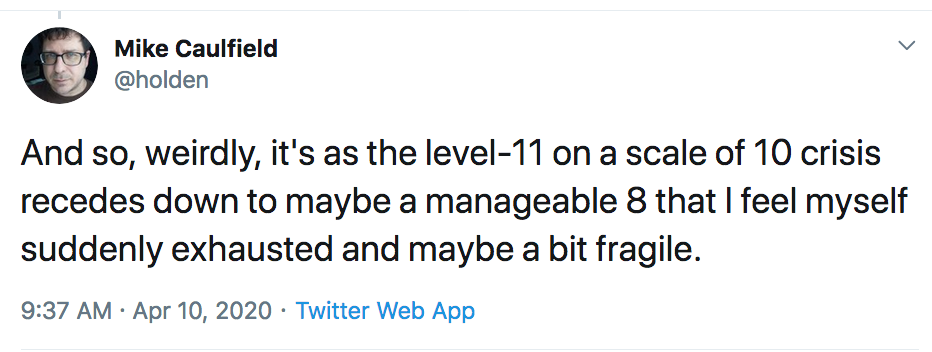
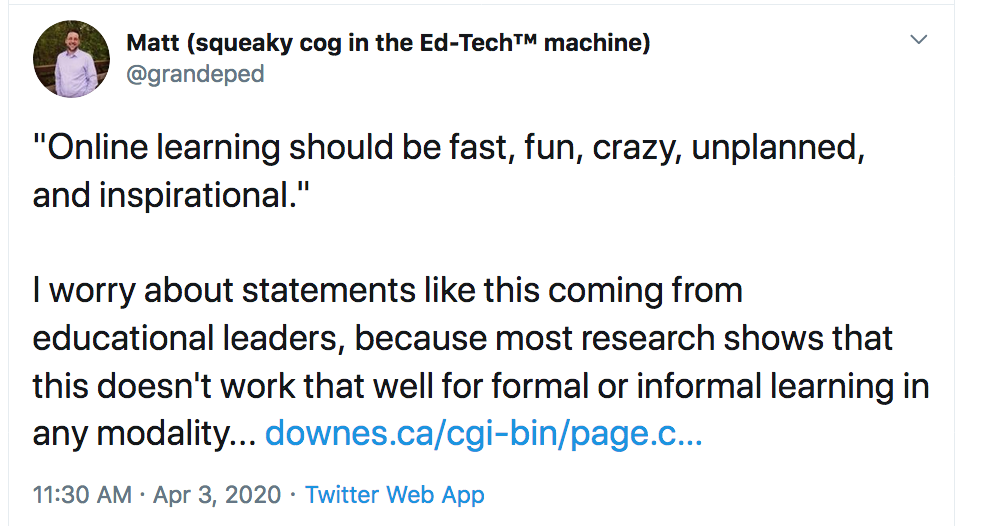
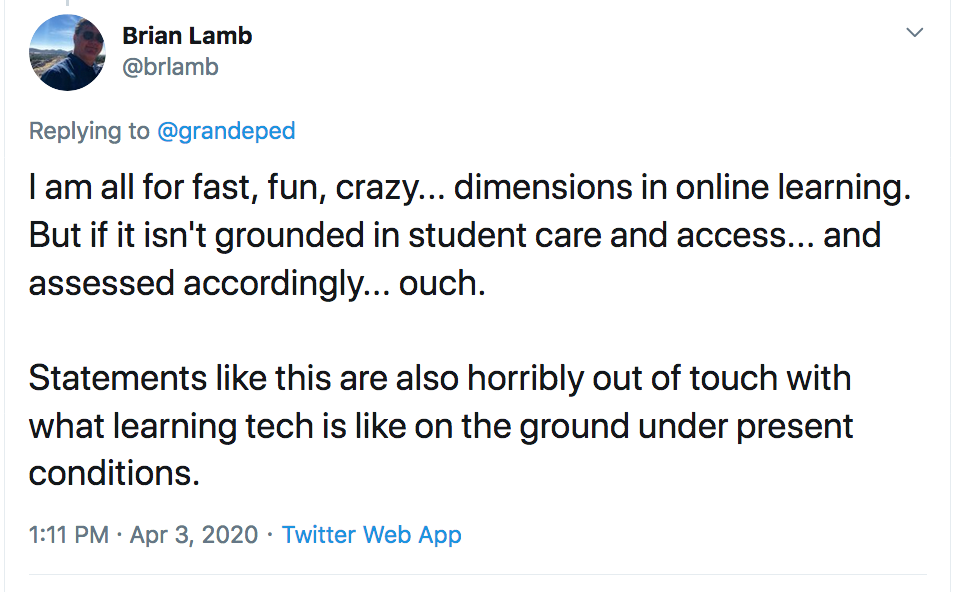
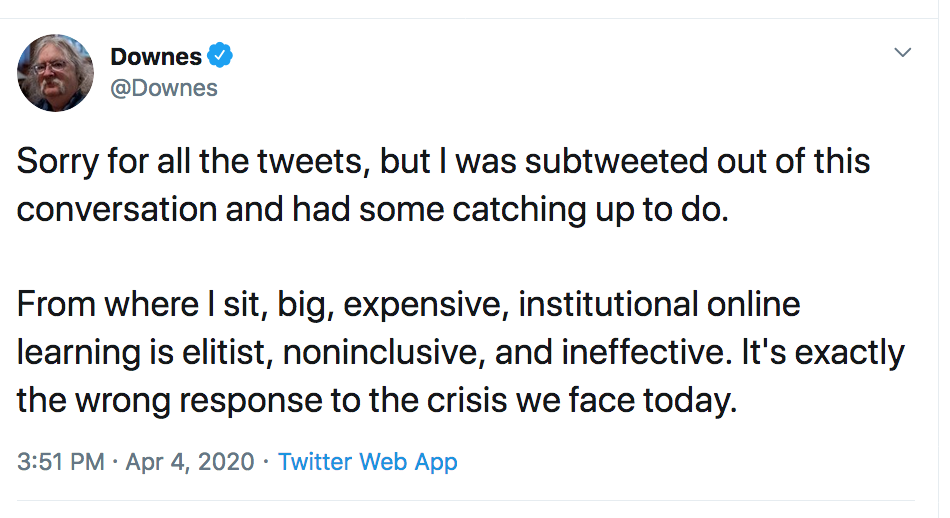
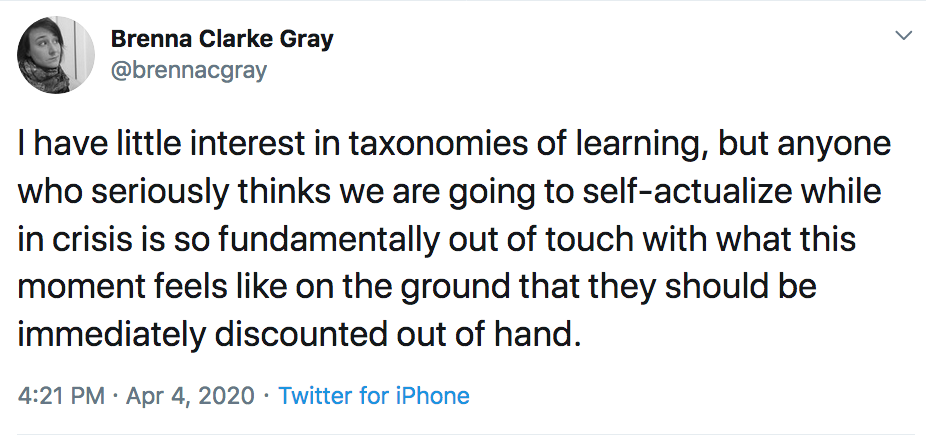
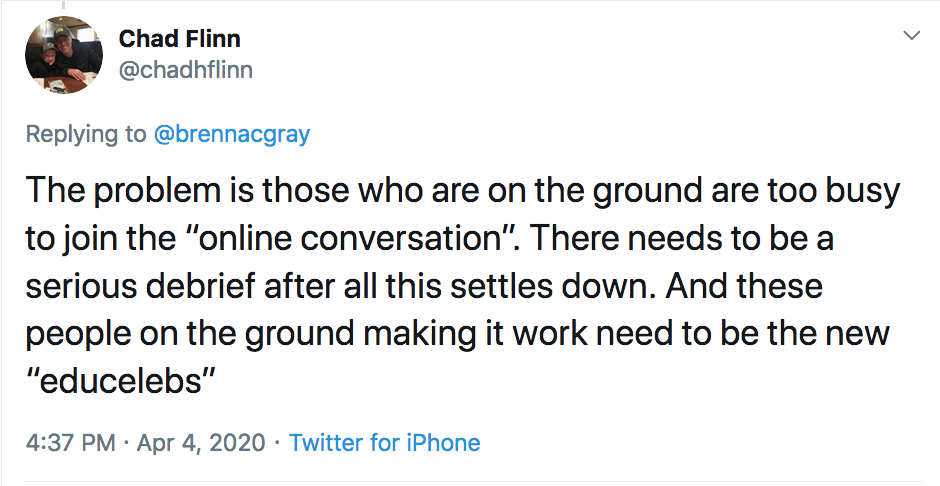
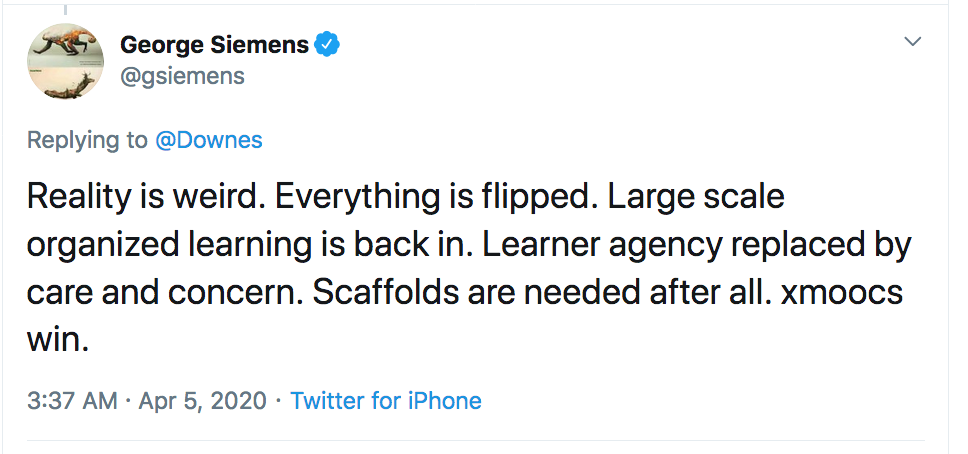
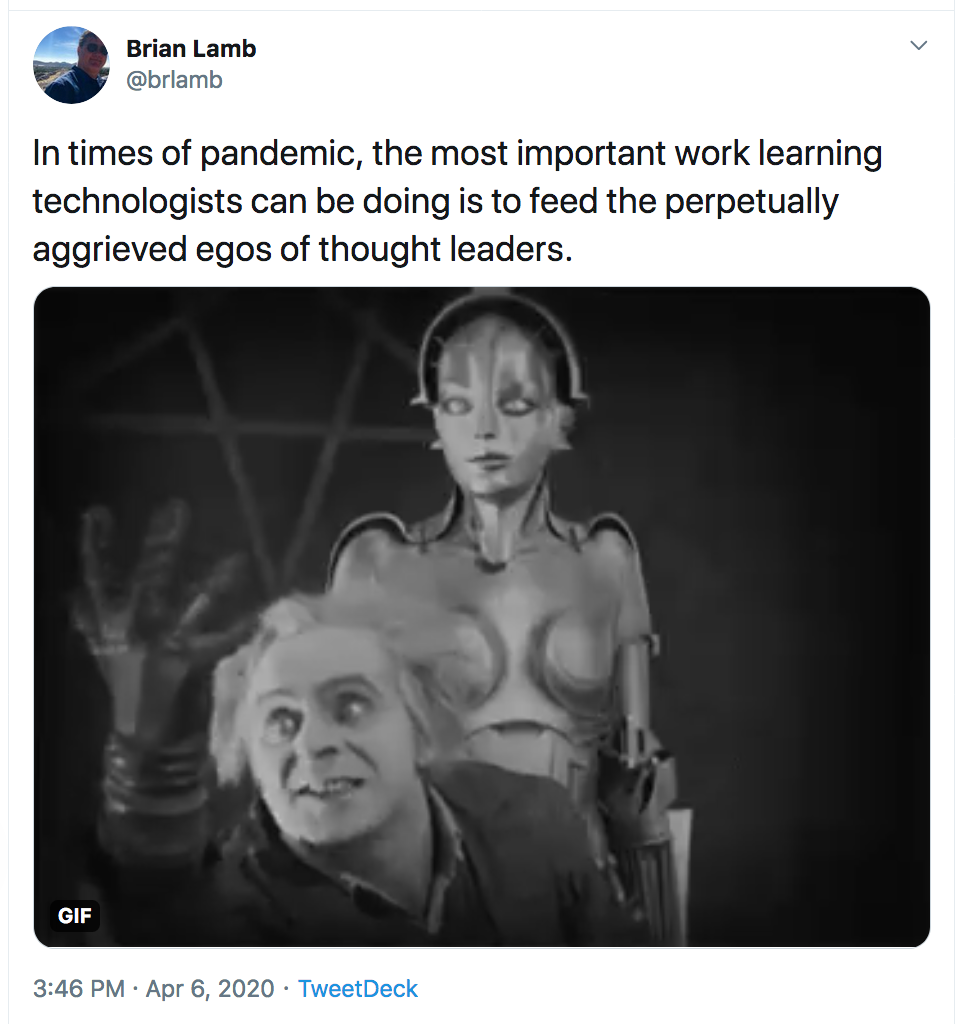
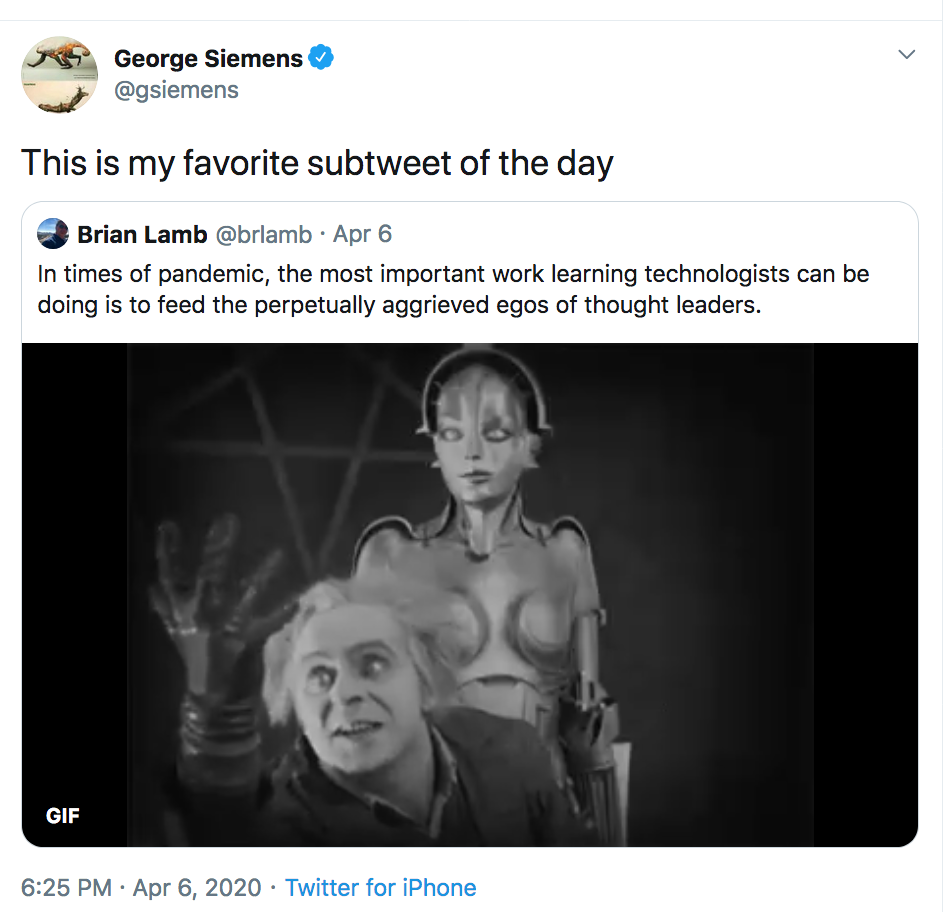

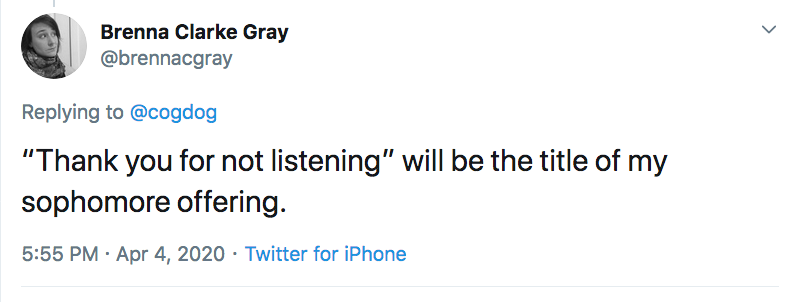
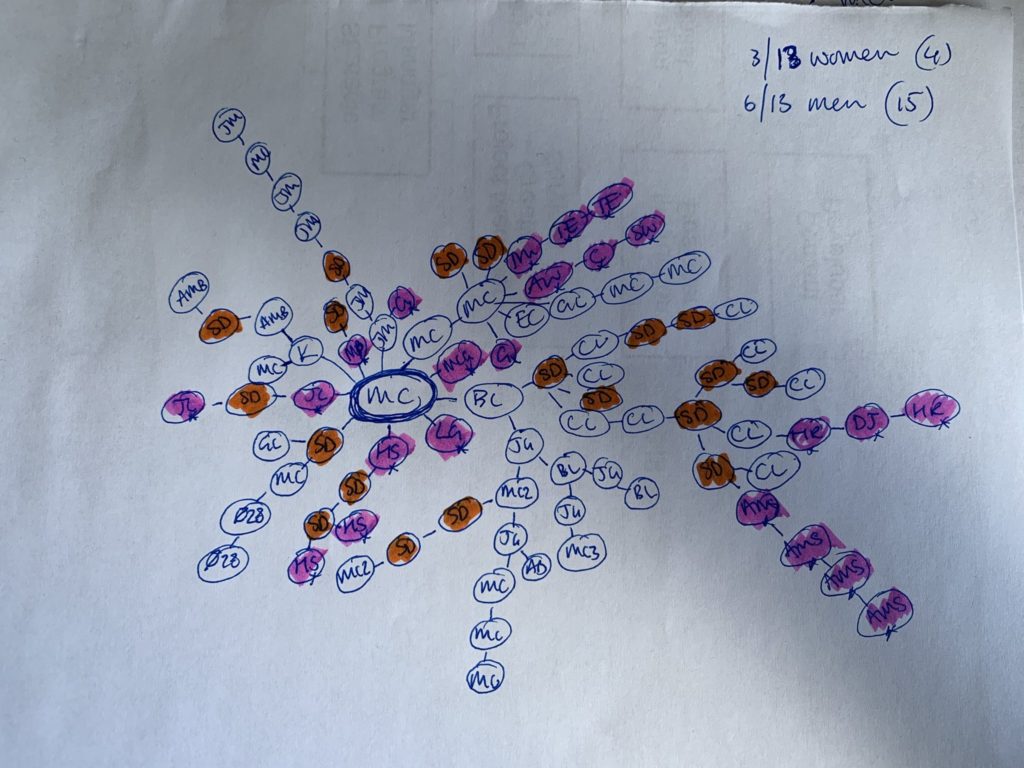
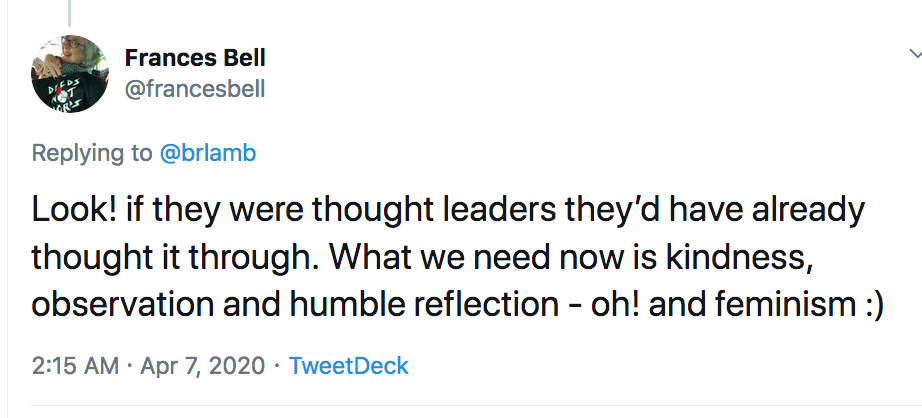
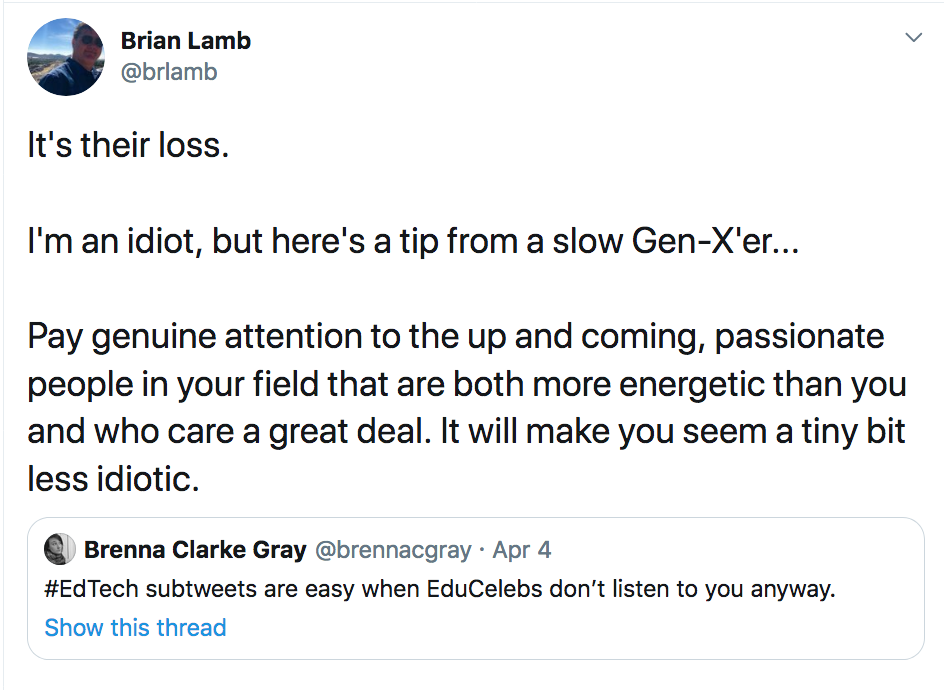

I snorted tea at Unabomber manifesto video, which broke me out of the dark place that “I am calling bullshit on that as one 17 year old doing a visualisation refutes everything” argument hole left me in
Kudos for this
I’m glad you had a laugh!
Thank you for this Brian, all of it. You raise up others and always have. Also remember to embrace that well deserved award that you just received. You earned it and continue to earn the respect of many.
I for one look to you when questioning my own practice and technique.
Thanks so much Ken. I did consider mentioning the award from students, because it is very meaningful. But I figured it would seem a bit braggy.
We love you Brian, and all your wonderful network!
We love you back Nancy! Socially distanced hugs and chocolate!
What Nancy said.
Cheesy Fries 4 LIFE!
Thank YOU. This is just everything.
I am lucky to be in BC so I can work alongside your wonderful team!
I guess I’ve been living under a rock lately bc I
missed all this drama. But catching up on it here, I almost jumped out of bed right now to give this post a standing ovation.
Onward.
Plus one to this and hope you’re keep well Martha
I wanted to second Martha’s note. I missed this story, and appreciate both your narrative of it, Brian, as well as your reflections.
Martha — I wasn’t kidding about those boundless amounts of petty spite I have. It’s good that you have a more enlightened and healthy way of interacting with the online world. I truly appreciate you sharing that support, you have always been so inspiring and thought-provoking for me.
Thanks Bryan — it is probably a good sign you missed the hubbub while it was happening. It really was that dumb.
Many thanks for this, Brian. My appreciation and encouragement to you and the team at OL and so many others working crazy hours to hold it together in a pandemic, no less. You’re all an inspiration.
We miss you Irwin!
Thank you for sharing what you and your team have been going through. While I’ve been incredibly busy at my Uni I don’t think we are near at the exhaustion levels your team has experienced. Thank you for sharing their story and also all the great resources. I’ve been “back in the ed tech game” since October and I’ve been trying to suss out who is doing the work these days and this is very helpful. Keep it up TRU team!
It’s great to have you back in the game Shannon. Let’s do this!
As always, you give your readers a lot to ponder in such entertaining and articulate ways, Brian. I enjoyed this very much. Being a staff at TRU (and knowing you and most members of your team) I’m extremely proud and grateful to have all of your skillsets, work ethic, and care for the students and faculty during this challenging time. Thank you for the glimpse into your story thus far. I hope peace and more rest come for you and your team sooner than later.
I wish we could be on a deck at the lake talking about this and other more important things Nicole! The work you do is such a big part of what makes us a cool place.
It’s almost artistic.
No it *is* fully artistic, the same voice I read long ago before some EDUCAUSE conference that said, “I want to hear that Lamb guy speak.”
Thanks, amigo, for being that voice and that friend and that colleague. We know what wins.
Is there a place to sign up for instant notifications of new installments in this beef? Please.
Wow! Seeing so many names from my life in the pretty distant past was a mind-bending trip!!
Hang in there, Brian. I am grateful for and humbled by the work that you and your team are doing.
While I have no desire (or place) to wade into the middle of this directly, I will say as somebody who is NOT working on the front lines every day that the urge to say something—*anything*—as a way of feeling useful is overwhelming. I’m trying to do my part during this phase of the crisis by staying out of the way and cheering front-line folks on, but I confess that it cuts against my natural inclination.
Hey Michael. You make an important point. No matter who we are, or where we are, we all want to make some contribution. And of course, there are so many people out there doing far more difficult and risky and unrewarded work.
You and I sometimes disagree, but I definitely am better informed and have a more effective sense of tech strategy because of your work. And it is never boring. There are very few people who do what you do, and I hope you can find a way. And next time we disagree, I’ll try to take a deep breath and be aware of my triggers before I hit that Tweet button.
Right back at you, Brian. I love reading your work. It makes me smarter. And for what it’s worth, I’ve never felt disrespected by you. Your writing is passionate but well reasoned and fair-minded, which is the combination that I aspire to in my own blogging.
But yeah, the passionate part comes easier than the rest sometimes.
Thanks for this excellent post Brian. I was aware of some of the discussions in Ed-tech but found this informative both from a theoretical and practical perspective. Not to mention it made the end of my day truly enjoyable.